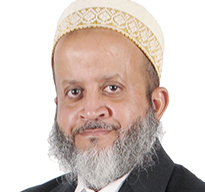Agenda | All times MYT (UTC+8)
Tuesday, November 10

Anwar Husen Akbar Ali
Head of Petroleum Engineering Department
Centre of Excellence
PETRONAS Carigali Sdn Bhd
With the industry facing challenges due to COVID-19 pandemic and low oil price, cost or value-driven solutions are required to ensure sustainability in project economics and effective management. The panelists will discuss the challenges faced by their organisations, and how they overcome the situation in achieving financial goals, as well as maximising recovery through integrated solutions and multi-disciplinary collaborations.
This session will focus on predicting the onset of rock failure leading to sand production; such as location, timing, volume, and rate of solids production over the well lifecycle. Conditions such as function of rock mechanical properties, grain size, geological stress, wellbore orientation, perforation geometry, flow rate, reservoir pressure, and water cut are the critical areas to be reviewed in this process.
Predicting solids volumes and rates are still considered challenging, however, credible sand predictions are critical to provide valuable insights to completion and production engineers, to develop fit-for-purpose sand management and sand control strategies.
This session aims to discuss proven case studies from both clastics and carbonate reservoirs, the robustness and reliability of current analytical, and numerical geomechanical sand prediction methodologies.
Discussion Leaders:
-
Credibility of Geomechanical Sanding Predictions at Early Field Life, Case Studies with Subsequent Years of Production and Field Observations, Abbas Khaksar, Baker Hughes
-
Volumetric Sanding Prediction and Validation for A Malaysian Gas Field, Nik Mohammad Fadhlan Bin Nik Kamaruddin, PETRONAS
-
Sand Mass Production in True Triaxial Conditions: From the Lab to the Field, Euripides Papamichos, SINTEF
-
Fines Migration Prediction – Fit for Purpose Solution for Brownfields, Siti Rohaida Mohd Shafian, PETRONAS Research Sdn Bhd
Wednesday, November 11
This session encompasses methodologies, lessons learnt and best practices from evaluation of both successes and failures during completion installation and long-term production. The focus of this session will include downhole solids control applications in open hole and cased hole, such as standalone screen completions, gravel packs, high rate water pack, and frac-pack. The continuous improvement of solids management operations is rooted in the understanding of both installation and performance, which can only be achieved through detailed data analysis and evaluation.
Discussion Leaders:
-
Casing Conveyed Sand Control and Cementing, Gordon Milne, Brunei Shell Petroleum
-
Novel Multi-Zone Open-Hole Gravel Pack Completion Design, Oswaldo Huertas, Schlumberger Australia
-
New Approaches in Sand and Fines Control Through Improved Fracpack and Sand Consolidation Offshore Malaysia, Amr Zeidan, PETRONAS Carigali Sdn Bhd
-
Key Learnings From Recent High Rate Water Packs in Brunei Shell Petroleum, Tang Lik Jin, Brunei Shell Petroleum
The remedial of sand issues caused by primary sand control installation failure, or wells that are completed without sand control, is an inherent problem in the oil and gas industry. Effective solutions have been extremely limited and costly; however, when these solutions are applied correctly, it can optimise the cost, safeguard assets, and prolong field life. This session will uncover the common ‘myths’ surrounding remedial sand control, and discuss lessons learnt on proper technique selection and placement, mechanical vs. chemical solutions, novel technologies, and innovative approaches.
Discussion Leaders:
-
Performance of Meshrite Screens as Sand Control Remediation in Beam Pump Well Application, Nisa Rizal, Brunei Shell Petroleum
-
Thru Tubing Gravel Pack Concept Select Studies, Vipin Tyagi, Brunei Shell Petroleum; Muhammad Hazman Nasir, Brunei Shell Petroleum
-
Formation Consolidation Chemical: Indonesia Field Trial and Integrated Approach with Scale Inhibitor, Chad Williams, Baker Hughes; Guritno Wirandoko, Baker Hughes
-
Improved Prediction of Grain Size Distributions Using Compositional Models, Stephen Tyson, Universiti Teknologi Brunei
Thursday, November 12
Traditionally, sand sampling revolves around spot sampling which poses several challenges such as HSE, transient nature of sand production, and risk of impairment to samples during the collection and processing stages. Sand monitoring, on the other hand, utilises manual, intrusive/non-intrusive methods, and interpretation of the data.
Prediction of sand count, erosion rate, and subsequent sand volume with respect to time-based machine learning can improve decision making in sand management, and proactively make corrective measurement for Loss of Primary Containment (LOPC) avoidance. With a single source of integrated database, this has become the new way of working in holistic sand management to accelerate analysis and design. This session focuses on the challenges surrounding hardware, data analysis, HSE of sand sampling and monitoring, and how digitalisation can improve the way to manage sand issues.
Discussion Leaders:
-
Online Sand Risk Assessment Tool, Amal Majeedah Aji, Brunei Shell Petroleum Company
-
Ultra-Sound Based Downhole Sand Monitoring for Production Optimization, Farisha Ragbirsingh, PETRONAS Carigali Sdn Bhd; Duncan Troup, Archer
-
Development of an Algorithm to Predict Outgoing PSD via Sand Control System Using Data Science Approach, Vinnavadi C Babu Sivakumar, Greenfield Oil and Trading Services Pvt; Abhishek Gupta, Greenfield Oil and Trading Services Pvt Ltd
-
Real-Time Erosion Monitoring Using Basic Thermodynamic Principles and the SPPS Tool, Jason Chong, Shell
The dynamic and transient nature of multi-phase flow is the primary cause of low solids removal efficiency using conventional methods. Hazardous contaminants, such as mercury or Naturally Occurring Radioactive Material (NORM) in reservoir fluids or gas, can complicate the handling process of solids removed. As this becomes a risk for operators, stringent procedures and novel solutions are necessary.
Surface handling, as an initial strategy or in the case of downhole control failure, requires an estimate of expected solids volume, transport, and deposition modelling while ensuring the erosional integrity of downhole/wellhead/choke/flowline components. Safe and environmentally sustainable solids disposal becomes the final link in the surface sand management chain. This session will focus on solids handling on the surface, which require holistic strategies of solids management.
Discussion Leaders:
-
Enhanced Production through Surface Facilities Sand Management, Charles “Hank” Rawlins, eProcess Technologies
-
Idling Desander Analysis - Application, Lessons Learnt and Future Application, Mohana Ramanee Thamilarasu, PETRONAS Carigali Sdn Bhd
-
Thinking Beyond Subsurface Sand Remediation, Nigel Brian Chin, Brunei Shell Petroleum
-
Novel Platform Bulk Desanding System, Cooberan Thambirajah, NGLTech Sdn Bhd
